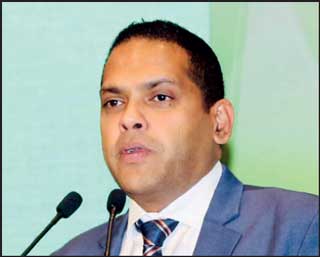Saturday Feb 21, 2026
Saturday Feb 21, 2026
Wednesday, 29 November 2023 00:00 - - {{hitsCtrl.values.hits}}
 |
| President Ranil Wickremesinghe |
 |
| Tourism Minister Harin Fernando |
 |
| THASL President M. Shanthikumar
|
President Ranil Wickremesinghe on Monday urged the hotels to go above the Minimum Room Rate (MRR) harnessing Sri Lanka’s culinary prowess, culture, diversity and scenic beauty.
Speaking at the Tourist Hotels Associ-ation of Sri Lanka (THASL) 58th Annual General Meeting hosted by Shangri-La Colombo, the President said the industry must move away from MRR and seek higher revenue. He commended the industry’s anticipated achievement of 1.5 million tourists in 2023 but noted “Looking back at 2021, yes, it is good, but next year we must target 2.5 million tourists,” Wickremesinghe said adding that the hotels should set sights on $ 250 or $ 500 per room night.
“When you achieve 7.5 million tourists by 2030 let us set sights on $ 750 or $ 1000 per night maximum,” emphasised Wickremesinghe.
The challenge thrown out to the tourism industry was part of awkward questions posed by the President at THASL AGM, at which industry veteran M. Shanthikumar was re-elected for another term.
Acknowledging that tourism is one of the low hanging fruits to boost foreign exchange earnings, the President said the challenge was to boost arrivals and income. He recalled that Vietnam, which has a much younger tourism industry, draws more arrivals than Sri Lanka. Then, the President questioned whether Sri Lanka is getting the desired income per tourist. It was in this context that Wickremesinghe said one of the means is via Sri Lanka’s cuisine and fusion with the rest of Asia and the world, the country can attract more tourists.
Another suggestion made by the President was enhancing sight scenes for the tourists both within the city and outside.
“We need to look at how we can develop the different areas. Let’s work on it. Sri Lanka has to be sold as a whole product. We need new thinking and strategy,” Wickremesinghe said.
Tourism Minister Harin Fernando in his speech was of the view that minimum room rate has helped the tourism industry though he too pointed out that Sri Lanka needs to seek beyond.
“Right now the biggest debate seems to be the minimum room rate. I am sure SLAITO members sometimes disagree with me. But we had a crisis at one time, how to retain the staff in the hotels, how to keep paying the loads, and that was one of the arguments we had,” Fernando said.
He recalled that in 2019, before the Easter Sunday setbacks the minimum hotel rate was at $ 120, and at present it is only $ 100. “Post the minimum rate, we have had a 16% decrease in occupancy, but a 25% increase on revenue,” Fernando said. “That means it has a pretty good supply. But I would like to see THASL also promoting themselves more and being a brand that we can sell around the world,” Tourism Minister stressed.
“I think Sri Lanka has a position themselves, as it is different from Thailand, Malaysia or Singapore. We have to have our own unique identity and promote Sri Lanka as a better destination,” Fernando said and detailed past and on-going measures to boost the destination. “Let’s all work together,” he added.
THASL President M. Shanthikumar in his speech expressed the hope that all stakeholders in the industry will work towards enhancing value rather than following a volume driven strategy.
“We are not Thailand nor are we Malaysia where their arrival target exceeds 30 million tourists. Hence, they will be on a volume driven strategy. We are at the moment going behind segments which have no other place to go. Meaning selling cheap. We are a small nation and should look at the Maldives, Mauritius etc. They continue to attract upscale tourism and so should we.
Selling cheap causes medium and long term damage to hotels as hotels are unable to maintain, upgrade or pay competitive wages. It is crucial for us to shift our focus to innovation and sustainable growth rather than price based competition. It will not help,” emphasised THASL Chief.
He recalled that the tourism industry went through four very difficult years since the Easter Sunday attack, followed by the pandemic and then the economic crisis.
“The business impact of the last four years was worse than the 30 year conflict period. Hoteliers have run out of their reserves after paying off their employees and spending on maintenance and limited operations of the hotels with no top line revenues. THASL members, especially the SME sector require a decent debt restructuring with a minimum of a 10 year repayment to be sustainable,” Shanthikumar said.
He said that the tourism debt which was Rs. 300 billion in 2018 had doubled to Rs. 600 billion by last year and is expected to reach Rs. 700 billion by end of 2023.
“If a proper restructuring does not take place, this could possibly balloon to one trillion in a few years, which we all know is unsustainable,” Shanthikumar pointed out.
He also said that all ministries and Government authorities should extend the same concessions afforded to other export industries to the tourism sector as well. “This means, reduction in taxes, duty free concessions for refurbishment etc.,” Shanthikumar added.
He also called for urgent consumer marketing which has been a far cry from the industry. “Demand growth would also help settlement of debt as yields are bound to increase. We are confident the debt crisis can be resolved through professional marketing of the destination. This is the need of the hour,” emphasised THASL Chief.
